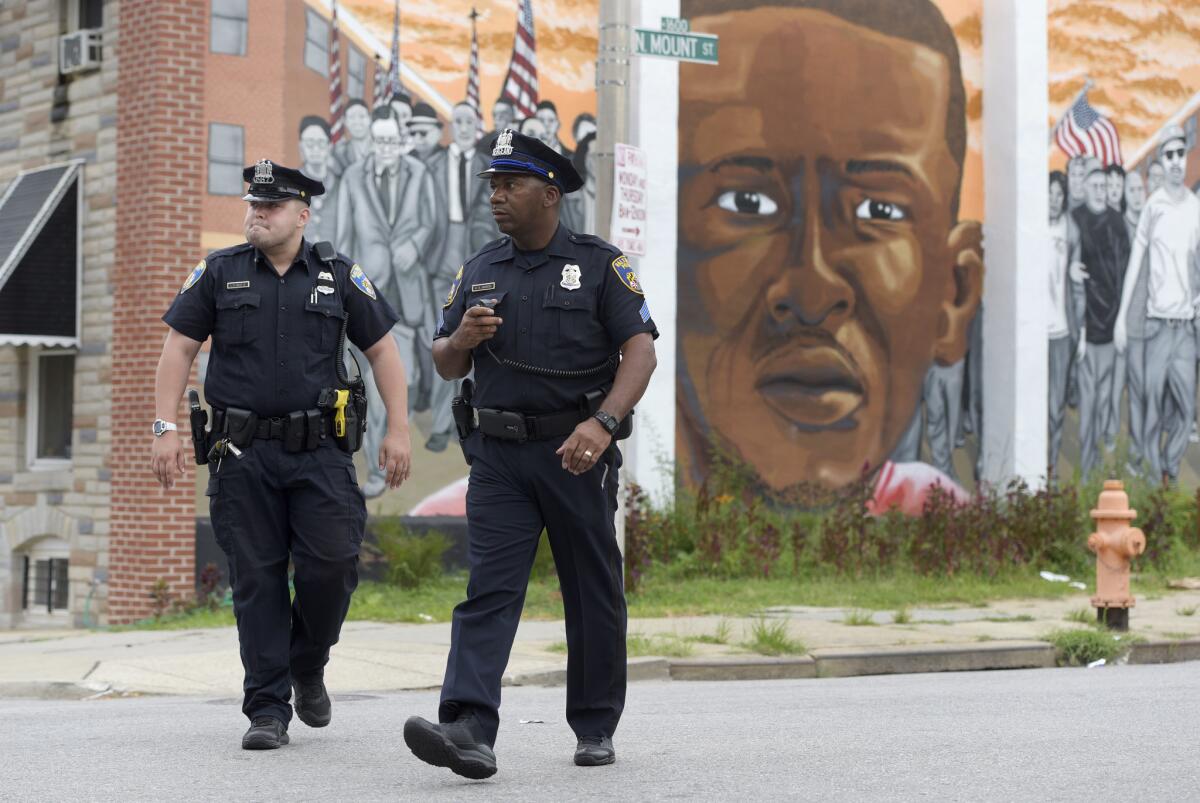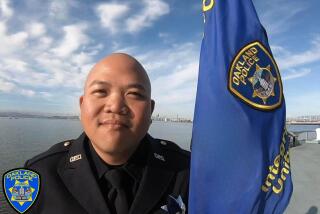Freddie Gray case comes to end with charges against 3 remaining police officers dropped

- Share via
Reporting from BALTIMORE — Prosecutors have dropped all remaining charges against three Baltimore police officers accused in the arrest and death of Freddie Gray, concluding a high-profile criminal case that captured national attention.
The startling move was an apparent acknowledgment of the unlikelihood of a conviction following the acquittals of three other officers on similar and more serious charges. The decision ends more than a year of dogged fighting to hold someone criminally accountable in Gray’s death after he was injured in police custody.
Officer William Porter’s trial ended with a hung jury and a mistrial in December. Circuit Judge Barry G. Williams acquitted Officers Edward Nero and Caesar Goodson and Lt. Brian Rice at bench trials in May, June, and July, respectively.
In a hearing Wednesday that was to start the trial of Officer Garrett Miller, Chief Deputy State’s Atty. Michael Schatzow told Williams that the state was dropping all charges against Miller, Porter and Sgt. Alicia White.
Porter had been scheduled to be retried in September, and White had been scheduled to be tried in October.
“All of our clients are thrilled with what happened today,” said Catherine Flynn, Miller’s attorney, outside the courthouse.
The officers still face possible administrative discipline. Internal investigations, with the help of outside police agencies, are underway.
Gray, 25, suffered severe spinal cord injuries in the back of a police van in April 2015 and died a week after his arrest. His death sparked widespread peaceful protests against police brutality, and his funeral was followed by rioting, looting and arson.
At a news conference in West Baltimore, near where Gray was arrested, Baltimore State’s Atty. Marilyn Mosby defended her decision to bring the charges against the officers, and said that “as a mother,” the decision to drop them was “agonizing.”
But, given Williams’ acquittal of Nero, Goodson and Rice and the likelihood that the remaining officers would also choose bench trials before him, Mosby said she had to acknowledge the “dismal likelihood” that her office would be able to secure a conviction.
“After much thought and prayer it has become clear that without being able to work with an independent investigatory agency from the very start, without having a say in the election of whether cases proceed in front of a judge or jury, without communal oversight of police in this community, without substantive reforms to the current criminal justice system, we could try this case 100 times and cases just like it and we would still end up with the same result,” she said.
She said there is an “inherent bias” whenever “police police themselves.” She said the charges she brought were not an indictment of the entire Baltimore Police Department, but she also broadly condemned the actions and testimony of some officers involved in Gray’s arrest or in the department’s investigation of the incident — alleging “consistent bias” at “every stage.”
Gray’s stepfather, Richard Shipley, said family members “stand behind Marilyn and her prosecuting team.”
“My family is proud to have them represent us,” he said, adding that the prosecutors did the “best to their ability.”
The officers, their defense attorneys and the union that represents the officers and paid for their defense held their own news conference shortly after Mosby’s.
Attorney Ivan Bates, who represents White and spoke on behalf of all of the officers and their attorneys, described the last year as a “nightmare” for the officers. He reiterated the defense argument in all of the cases that the officers were justified in their actions. The officers did not speak.
Police Commissioner Kevin Davis, in a statement, defended the department’s investigation into Gray’s death. He also called Mosby’s decision to drop the charges “a wise one” that will help the city heal and move forward.
“As the trials end and this chapter in Baltimore’s history closes, it is important that we collectively resolve to direct our emotions in a constructive way to reduce violence and strengthen citizen partnerships,” Davis said. “Any motives that fall short of that are counterproductive and inconsistent with the values of Baltimoreans.”
Rector writes for the Baltimore Sun.
ALSO
Homeland security chief is guided by memories of how a communist witch hunt scarred his family
More to Read
Sign up for Essential California
The most important California stories and recommendations in your inbox every morning.
You may occasionally receive promotional content from the Los Angeles Times.










